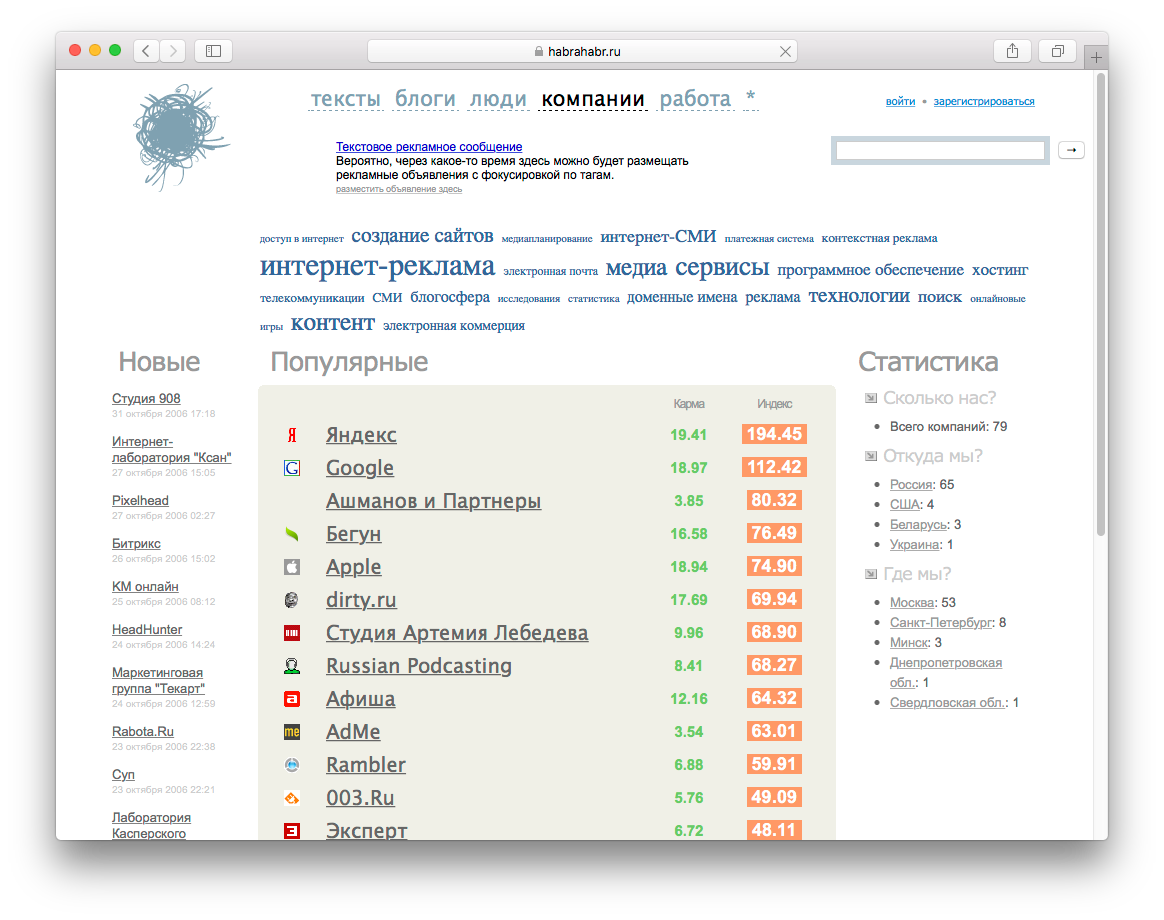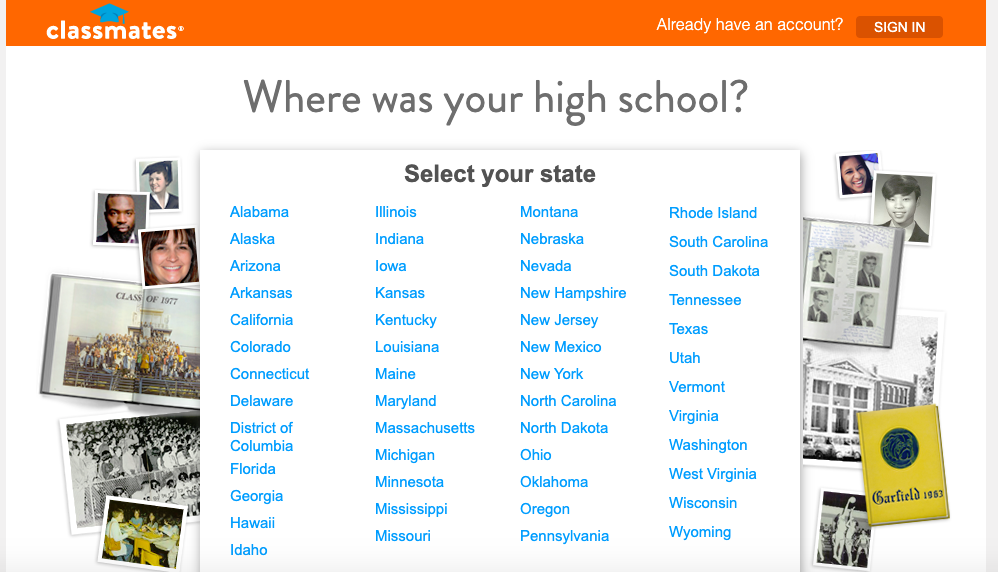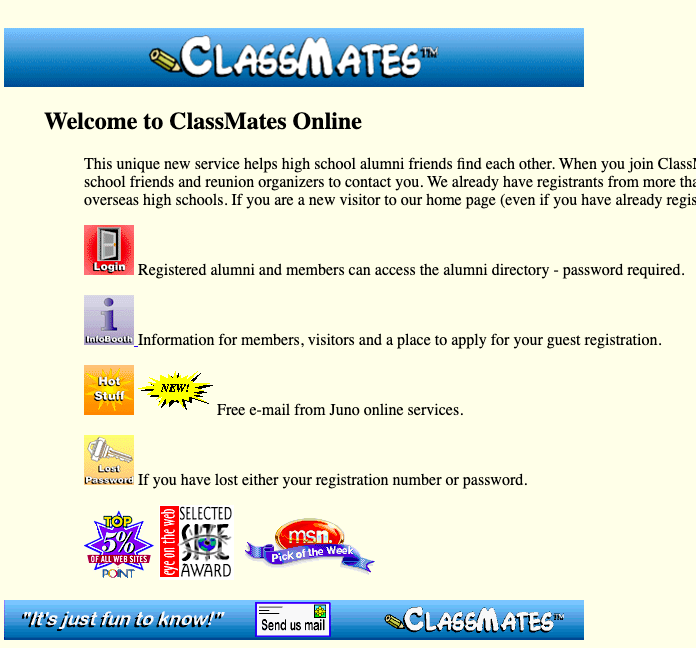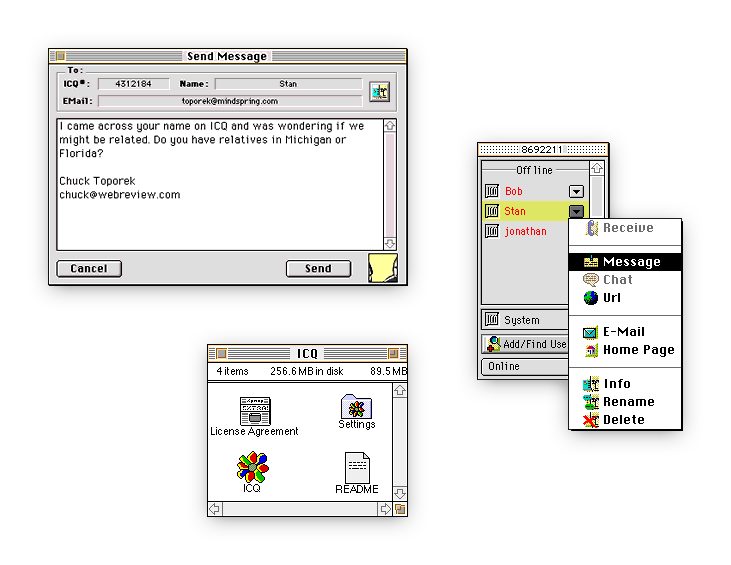We see no reason

Tim Berners-Lee and his world's first website
Let's start with Habr
It is logical to assume that the first post on Habré should have ID = 1 and look like this: habr.com/post/1/ . But this link contains a note by the founder of Habr Denis Kryuchkov about the creation of a Wiki-FAQ for Habrahabr (do you remember that the name of Habr was once longer?), Which does not in any way draw on the first welcome post.

This is how Habr looked in 2006.
It turns out that this publication was not actually the very first (Habr itself was launched on May 26, 2006) - we managed to find a publication as early as ... January 16, 2006! Here she is . At this point, we already wanted to call Sherlock Holmes to unravel this tangle (well, the one on the logo). But we, perhaps, will call for help from a more experienced hacker. How do you like thatboomburum?

And this is how the first corporate blogs looked on Habré. Picture from here
By the way, in both posts you can leave comments and from 2020 no one has written there yet (and this year is definitely worth witnessing).
The first social network
The first social network in the world is Odnoklassniki. But do not rush to be proud of this fact or be surprised at it: we are talking about the American network Classmates, which appeared in 1995 and was the same thing as you thought about in the first sentence of the paragraph. At the start, the user chooses the state, school, year of graduation, and after registration he plunges into the special atmosphere of such a social network. By the way, the site has undergone a redesign and still exists - moreover, it is still very popular.

Oh, this orange!

But the web archive remembers everything - this was the interface of the site at the beginning of its existence.
In Russia, the first social network appeared in 2001 - it is E-Xecutive, a popular and still active network of professionals (by the way, there are a lot of sensible materials and communities there). But "Odnoklassniki" of domestic bottling appeared only in 2006.
First web browser
The first browser appeared in 1990. The author and developer of the browser was the same Tim Berners-Lee, who called his application ... World Wide Web. But the name was long, difficult to remember and inconvenient, so the browser was soon renamed and became known as Nexus. But the general "favorite" Internet Explorer from Microsoft was not even the third browser in the world, Netscape wedged in between it and Nexus, it is also Mosaic and it is the predecessor of the famous Netscape Navigator, Erwise, Midas, Samba, etc. But it was IE that became the first browser in the modern sense, Nexus performed much narrower functions: it helped to view small documents and files on a remote computer (although this is the essence of all browsers, because, as Linkoids say, everything is a file). By the way, it was in this browser that the first site was opened.

Nexus interface

And again the creator with creation

Erwise is the world's first browser with a graphical interface and the ability to search for text on a page
The first online store
The emergence of the Internet as a set of interconnected computers could not leave business indifferent, because it opened up new opportunities for earning money and entering the trade zone that was almost unregulated at that time (we are talking about 1990 and later, before that the Internet, on the contrary, was practically a super secret sphere). In 1992, airlines were the first to enter the online trading area, selling tickets “online”.
The first online store sold books, and you probably already guessed at this place who was its creator? Yes, Jeff Bezos. And if you think that Mr. Bezos was passionate about how he loved books and dreamed of making the world educated and in love with reading, then you are wrong. Toys became the second commodity. Both books and toys are popular goods, which are also convenient to store, sort, and which do not have an expiration date and does not require particularly sensitive storage conditions. It is also convenient to pack books and toys and you should not worry about fragility, completeness, etc. Amazon's birthday is July 5, 1994

The time machine remembers Amazon only from the very end of 1998. DVD, Motorola - where is my 17 years old?
In Russia, the first online store was launched on August 30, 1996, and it was also the books.ru bookstore (I hope you know that it is still alive and well). But it seems to us that in Russia he was also a bookstore at the call of the soul, nevertheless, books in our country are goods with, perhaps, eternal popularity.

Books.ru in 1998
The first messenger
In order to avoid battles, I will make a reservation in the comments that we are not talking about messaging systems with limited access, but about those messengers that became available precisely in the era of the "universal" Internet. Therefore, the history of the messenger begins in 1996, when the Israeli company Mirabilis launched ICQ. It had multi-user chats, file transfer support, user search, and much more.

One of the first versions of ICQ. We took the picture on Habré and immediately recommend reading the article on how the ICQ interface changed
First IP telephony
The beginning of IP telephony was laid in 1993 - 1994. Charley Kline created Maven, the first PC program that could transmit voice over a network. Around the same time, CU-SeeMe, a video conferencing software developed at Cornell University for Macintosh PCs, gained popularity. Both of these applications literally gained space popularity - with their help, the flight of the space shuttle Endeavor was broadcast on Earth. Maven was streaming audio and CU-SeeMe was streaming image After a while, the programs were combined.

CU-SeeMe interface. Source: ludvigsen.hiof.no
First YouTube video
YouTube officially launched on February 14, 2005, and the first video was uploaded to it on April 23, 2005. The video with his participation was posted on the site by one of the creators of YouTube - Javed Karim (filmed by his school friend Yakov Lapitsky). The video is 18 seconds long and is called “Me at the zoo”. He didn't know yet about which zoo would start on this service, oh, he didn't know.
By the way, this is the only surviving video from the "test" ones, the very first ones. I will not retell the plot, see for yourself:
First meme
The first Internet meme infected the souls and brains of hundreds of thousands of users in 1996. It was launched by two graphic designers - Michael Girard and Robert Lurie. The video showed a toddler dancing to the track Hooked on a Feeling by singer Mark James. The authors sent out the "sticky video" to other companies, and then it was sent out by email to a huge number of users. I probably don't know anything about memes, but it looks a little intimidating.
By the way, this video was actually an advertisement - it demonstrated the new capabilities of the Autodesk program. The movements of the "baby Uga-chaga" began to be repeated all over the world (although at that time they could not upload them to YouTube). The meme was clearly a success.
And you know what we think. Could we then, being children and adolescents, assume that fate would unite us in one company RUVDS, through whose servers about 0.05% of the Russian Internet goes? And we are responsible for every byte of this colossal amount of information. No, friends, this is not fiction - this is life, which was laid by the hands of the First.
The article contains not all the "first artifacts" of the Internet. Tell us, what was the first thing you heard about on the Web? Let's indulge in nostalgia, or something.
